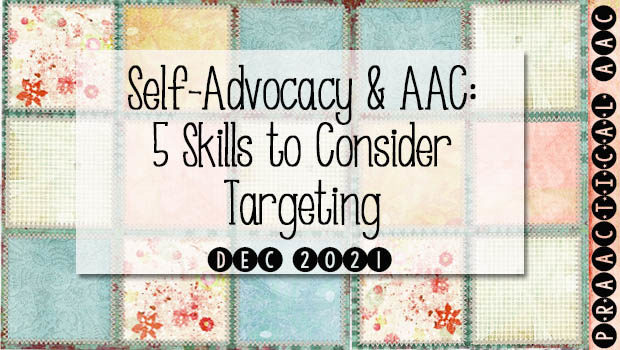Self-Advocacy & AAC: 5 Skills to Consider Targeting

Many AAC users need support from family, friends, and professionals in learning to advocate for themselves. Therapists and educators can support this process in many ways, starting with their ability to recognize all communicative acts and respond in respectful ways. At times, formal instruction and intervention are necessary to build specific skills that make it possible to advocate for one’s views and interests.
If you are supporting AAC users who are learning to advocate for themselves, here are some skills to consider targeting.
- Protesting and Rejecting: Objecting to events around us and refusing things that are offered are early-developing communicative functions that don’t seem to get enough attention. These are critical skills for all of us and AAC learners should be given the opportunity to develop a variety of strategies for this type of expression.
- Ranking: When AAC users can express their preferences by rank ordering different options, they can play a more powerful role in decision-making for things that involve them. Teaching them how to identify their options, decide how they feel about each one, and put them in order of preference can lead to them having a much more active role as decision-makers for things like:
- Choosing elective classes in school,
- Selecting who or where they want to do certain things, and,
- Deciding how to use their money, time, or other resources.
- Repairing Communication Breakdowns: Misunderstandings are inevitable in human interaction, whether or not AAC is part of the equation. Many learners can benefit from intervention to help them recognize and repair communication breakdowns, both when they are misunderstood by others and when others misinterpret them.
- Giving Instructions: Telling people what to do and how to do it is a powerful way to advocate for our interests. Giving directions may not come naturally to some AAC learners, particularly if they haven’t felt empowered to assert themselves in the past. Pre-stored messages can be helpful in some situations, especially if they will need to give the same set of instructions over and over.
- Giving Feedback: AAC users also need the ability to provide feedback to others. Michayla’s physical limitations prevented her from being independent with self-care, and she utilized the support of family members and personal care assistants throughout the day. She learned to give corrective feedback when they were doing things in ways that Michayla didn’t particularly like, such as applying too much make-up, rushing through her breathing treatments, and being a little rough during transfers out of her wheelchair. She also developed the skill of providing supportive feedback when the caregiver did things the way Michayla wanted them done.
Self-advocacy comes naturally to some people and others need help in developing that skill set. Do you have tips for building self-advocacy skills with people who use AAC? We’d love to hear about them.
—
Filed under: Featured Posts, PrAACtical Thinking
This post was written by Carole Zangari

1 Comment
I have tried to teach and explain this to many district staff members within school districts. Thank you for reiterating!